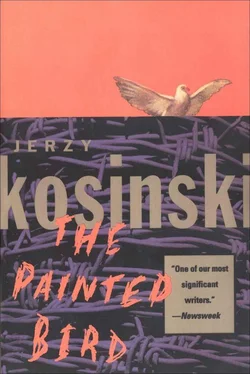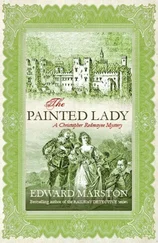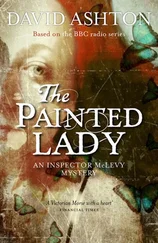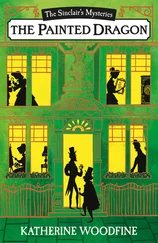Jerzy Kosiński - The Painted Bird
Здесь есть возможность читать онлайн «Jerzy Kosiński - The Painted Bird» весь текст электронной книги совершенно бесплатно (целиком полную версию без сокращений). В некоторых случаях можно слушать аудио, скачать через торрент в формате fb2 и присутствует краткое содержание. Год выпуска: 1965, ISBN: 1965, Жанр: Детская проза, на английском языке. Описание произведения, (предисловие) а так же отзывы посетителей доступны на портале библиотеки ЛибКат.
- Название:The Painted Bird
- Автор:
- Жанр:
- Год:1965
- ISBN:978-0-8021-9575-3
- Рейтинг книги:4 / 5. Голосов: 1
-
Избранное:Добавить в избранное
- Отзывы:
-
Ваша оценка:
- 80
- 1
- 2
- 3
- 4
- 5
The Painted Bird: краткое содержание, описание и аннотация
Предлагаем к чтению аннотацию, описание, краткое содержание или предисловие (зависит от того, что написал сам автор книги «The Painted Bird»). Если вы не нашли необходимую информацию о книге — напишите в комментариях, мы постараемся отыскать её.
The Painted Bird — читать онлайн бесплатно полную книгу (весь текст) целиком
Ниже представлен текст книги, разбитый по страницам. Система сохранения места последней прочитанной страницы, позволяет с удобством читать онлайн бесплатно книгу «The Painted Bird», без необходимости каждый раз заново искать на чём Вы остановились. Поставьте закладку, и сможете в любой момент перейти на страницу, на которой закончили чтение.
Интервал:
Закладка:
At dawn when the birds were sleeping we would venture out to stalk up to their nests. Lekh strode ahead, carefully jumping over bushes and shrubs. I followed directly behind. Later on, when daylight reached even the most shaded corners of the forest and fields, we would take the terrified, thrashing birds from the traps we had set the day before. Lekh removed them carefully, either speaking soothingly to them or threatening them with death. Then he would put them into a large bag slung over his shoulder, in which they would struggle and stir until their strength waned and they calmed down. Every new prisoner pushed down into the bag brought new life, causing the bag to quiver and swing against Lekh’s back. Above our heads the friends and family of the prisoner would circle, twittering curses. Lekh would then look up from under his gray eyebrows and hurl insults at them. When the birds persisted, Lekh put the bag down, took out a sling, placed a sharp stone in it, and, aiming it carefully, shot it at the flock. He never missed; suddenly a motionless bird would hurtle from the sky. Lekh would not bother to look for the corpse.
When noon approached, Lekh hastened his steps and wiped the perspiration from his brow more often. The most important hour of his day was nearing. A woman locally nicknamed Stupid Ludmila was waiting for him in some distant forest clearing known only to the two of them. I would proudly trot behind him, the bag of twitching birds slung over my shoulder.
The forest became increasingly dense and forbidding. The slimy striped trunks of snake-colored hornbeams shot straight up into the clouds. The linden trees, all of which, according to Lekh, remembered the very beginnings of the human race, stood broad-shouldered, their trunks resembling coats of mail festooned with the gray patina of mosses. The oaks stretched out of their trunks like the necks of starving birds looking for food, and obscured the sun with gloomy branches, casting the pines and poplars and lindens into shadow. Sometimes Lekh would stop and silently look at some spoors in the crannies of decaying bark, and in tree knots and gallnuts full of black, curious holes from whose interior shone bare white wood. We would pass through groves of young birches with lean, fragile shoots, diffidently flexing their thin, small branches and buds.
Through the gauzy curtain of foliage we were noticed by perching flocks of birds who became frightened and would soar away with beating wings. Their chirping mixed with the chorus of bees murmuring around us like a moving, gleaming cloud. Lekh protected his face with his hands and fled from the bees to a denser thicket, while I ran at his heels holding on to the bag of birds and basket of traps, waving my hand to drive off the harassing and vengeful swarm.
Stupid Ludmila was a strange woman and I feared her increasingly. She was well built and taller than the other women. Her hair, seemingly never cut, cascaded down her shoulders. She had large breasts, which hung nearly to her belly, and strong muscular calves. In the summer she went around dressed only in a faded sack which revealed her breasts and a clump of red hair at her crotch. Men and boys would tell of the pranks they played with Ludmila when she was in the mood. The village women often tried to trap her but, as Lekh said with pride, Ludmila’s tail was windblown and no one could catch her against her will. She would disappear in the undergrowth like a starling and creep out when no one was around.
No one knew where her lair was. Sometimes at dawn when peasants walked to the fields, scythes on their shoulders, they saw Stupid Ludmila waving to them amorously from afar. They would halt and wave back to her, stretching their arms lazily as their will to work weakened. Only the calls of their wives and mothers, approaching with sickles and hoes, brought them back to their senses. Women often set dogs on Ludmila. The largest and most dangerous one ever sent to attack her decided not to return. After that she would always appear holding the animal by a rope. The other dogs would flee with their tails between their legs.
It was said that Stupid Ludmila lived with this huge dog as with a man. Others predicted that someday she would give birth to children whose bodies would be covered with canine hair and who would have lupine ears and four paws, and that these monsters would live somewhere in the forest.
Lekh never repeated these stories about Ludmila. He only mentioned once that when she was very young and innocent her parents ordered her to get married to the son of the village psalmist, notorious for his ugliness and cruelty. Ludmila refused, infuriating her fiancé so much that he enticed her outside the village where an entire herd of drunken peasants raped the girl until she lost consciousness. After that she was a changed woman; her mind had become addled. Since no one remembered her family and she was considered not too bright, she was nicknamed Stupid Ludmila.
She lived in the forests, lured men into the bushes and pleased them so much with her voluptuousness that afterwards they could not even look at their fat and stinking wives. No one man could satisfy her; she had to have several men, one after another. And yet she was Lekh’s great love. He made up tender songs for her in which she figured as a strange-colored bird flying to faraway worlds, free and quick, brighter and more beautiful than other creatures. To Lekh she seemed to belong to that pagan, primitive kingdom of birds and forests where everything was infinitely abundant, wild, blooming, and royal in its perpetual decay, death, and rebirth; illicit and clashing with the human world.
Every day at noon Lekh and I would walk toward the clearing where he hoped to meet Ludmila. When we arrived Lekh hooted in imitation of an owl. Stupid Ludmila would rise above the tall grass, bluebottles and poppy flowers intertwined in her hair. Lekh rushed eagerly toward her and they stood together, swaying slightly like the grasses around them, almost growing into each other like two tree trunks rising up from a single root.
I watched them from the edge of the clearing, behind the leaves of ferns. The birds in my bag were disturbed by the sudden stillness and chirped and floundered and excitedly beat their wings against each other. The man and woman kissed each other’s hair and eyes, and rubbed cheek against cheek. They were intoxicated by the touch and smell of their bodies and slowly their hands became more playful. Lekh moved his big, calloused paws over the smooth arms of the woman while she drew his face closer to hers. Together they slid down into the tall grass which now shook above their bodies, partly concealing them from the curious gaze of the birds gyrating over the clearing. Lekh would say afterwards that while they lay in the grass Ludmila told him stories of her life and her sufferings, disclosing the quirks and kinks of her strange untamed feelings, all the byways and secret passages that her frail mind wandered through.
It was hot. There was not a breath of wind and the treetops stood rigid. The grasshoppers and dragonflies buzzed; a butterfly suspended on an invisible breeze hovered over the sun-whitened clearing. The woodpecker ceased pecking, the cuckoo grew silent. I dozed off. Then I was awakened by voices. The man and the woman stood clinging to each other as if grown into the soil, saying words to each other I did not understand. They separated reluctantly; Stupid Ludmila waved her hand. Lekh strode toward me, repeatedly turning to look at her as he stumbled, a wistful smile on his lips.
On the way home we set more traps; Lekh was tired and withdrawn. In the evening, when the birds fell asleep in their cages, he cheered up. Restless, he spoke of Ludmila. His body trembled, he giggled, closing his eyes. His white pimply cheeks grew flushed.
Читать дальшеИнтервал:
Закладка:
Похожие книги на «The Painted Bird»
Представляем Вашему вниманию похожие книги на «The Painted Bird» списком для выбора. Мы отобрали схожую по названию и смыслу литературу в надежде предоставить читателям больше вариантов отыскать новые, интересные, ещё непрочитанные произведения.
Обсуждение, отзывы о книге «The Painted Bird» и просто собственные мнения читателей. Оставьте ваши комментарии, напишите, что Вы думаете о произведении, его смысле или главных героях. Укажите что конкретно понравилось, а что нет, и почему Вы так считаете.












